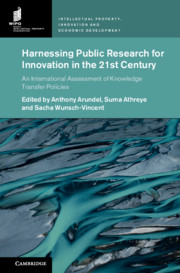Promoting public–private partnership knowledge transfer is one of common notice among countries at different economic development levels. A vital question for policymakers today is how to improve the efficiency of these knowledge transfer practices, maximizing innovation-driven growth.
No unique knowledge transfer blueprint is recognized as time-tested and universally optimal. The Chinese government has been continuously highlighting and facilitating the transformation of scientific and technological achievements into real productive forces. The Chinese knowledge transfer law, Promoting the Transformation of Scientific and Technological Achievements, entered into force on October 1, 1996. An amendment to the law was adopted at the meeting of Standing Committee of the Twelfth National People’s Congress on August 29, 2015, and came into force on October 1, 2015. The modification mainly includes: refining the science and technology performance assessment system, improving the scientific and technological achievements disposal and distribution right systems, perfecting the market pricing mechanism of scientific and technological achievements, strengthening the awards for main scientific and technological contributors, and so on. Meanwhile, lots of high- and middle-income countries have been developing their national law and policies for spurring on the commercialization of publicly funded inventions. Unfortunately, it is not straightforward for policymakers to access information on what works and what does not. Initial evidence indeed suggests that different approaches are needed for different stages of economic development and even for specific sectors. Nevertheless, these experiences and lessons need refining to be used by political makers.
With this in mind, in 2015, under the auspices of the World Intellectual Property Organization (WIPO) and most of China, a joint research project on knowledge transfer policies and practices was initiated with the support of some countries. Two such academic and policy workshops were held with authors and experts in July 2016 and March 2017 to validate the research focus and unify methodologies. We have compiled the main research results into this book.
The main contribution of this book is twofold: To start with, the book develops a conceptual framework to evaluate knowledge transfer practice and outcomes. It provides a six-country study in the same conceptual framework, three middle- and three high-income countries, and also puts forward a standardized set of metrics for assessing national or institutional performance relevant to both high- and middle-income countries’ development. With all these efforts, it is possible to do an international comparison at different income levels. The country cases will reveal a wide range of approaches and a variety of tools for policymakers, professional associations, IP offices, and scholars.
I would like to take this opportunity to express my sincere gratitude to the editors and authors for their great contribution to this book. The research represents a major step toward reaching a systematic approach to the measurement of knowledge transfer practice and outcomes. It lays important groundwork for future empirical work, for the development of appropriate metrics, and for crafting new innovation policy approaches. I look forward to the WIPO contributing further valuable works on innovation, intellectual property, and economic development to better benefit its member states at large.

